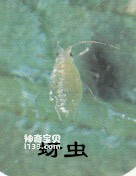Aphids are also called grub bugs, morning bugs, honey bugs, ant bugs, etc. Although their bodies are small, they can cause great harm to plants. Among them, except for the gall aphid, which is a beneficial insect, the rest can be said to be devastating pests. There are almost no roots, stems, leaves, bark, buds, flowers and fruits of all forest trees, fruit trees, flowers, vegetables, grain, cotton, oilseeds and other crops that it does not harm. Aphids use their needle-like mouthparts to pierce plant tissues and suck out plant juices, causing the damaged plants to curl their leaves, wither, and in severe cases, even die. For example, tobacco aphids harm tobacco, causing plant growth to slow down and reducing the quality of tobacco leaves. The leaves will turn dark brown after baking and have poor water absorption, seriously affecting the harvest. The honeydew (feces) secreted by aphids can induce the occurrence of coal fungus, hindering the leaves from producing nutrients, causing flowers, leaves, and fruits to quickly lose their beautiful appearance. At the same time, aphids are also the spreaders of various plant virus diseases. Therefore, preventing and controlling aphid damage is an important measure to ensure increased agricultural production.

Aphids cause serious harm because they can adapt to different living environments with diverse lifestyles. In the warm south, there is no need to overwinter. Winged or wingless parthenogenetic aphids reproduce throughout the year. That is, they do not need to mate with male aphids to produce offspring. The eggs stay in the mother's body until the embryo matures and are excreted. , are born as small aphids. Aphids can also produce winged or wingless aphids with the rise and fall of host plants, and can migrate to find suitable pests. Aphids develop quickly and have a short life cycle. One generation can be completed in seven or eight days, so they have extremely strong reproductive capabilities. On average, a single aphid can produce more than 70 offspring. In addition, aphids eat a wide range of food, and some aphids can be parasitic. It exists on more than 100 kinds of plants, so it occurs widely and causes serious damage, making it an important pest worldwide.
animal tags:
We created this article in conjunction with AI technology, then made sure it was fact-checked and edited by a Animals Top editor.